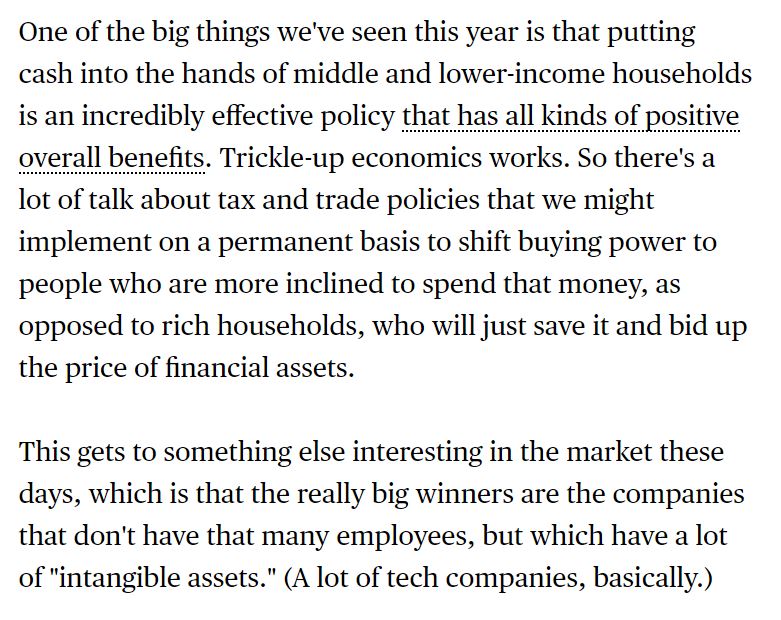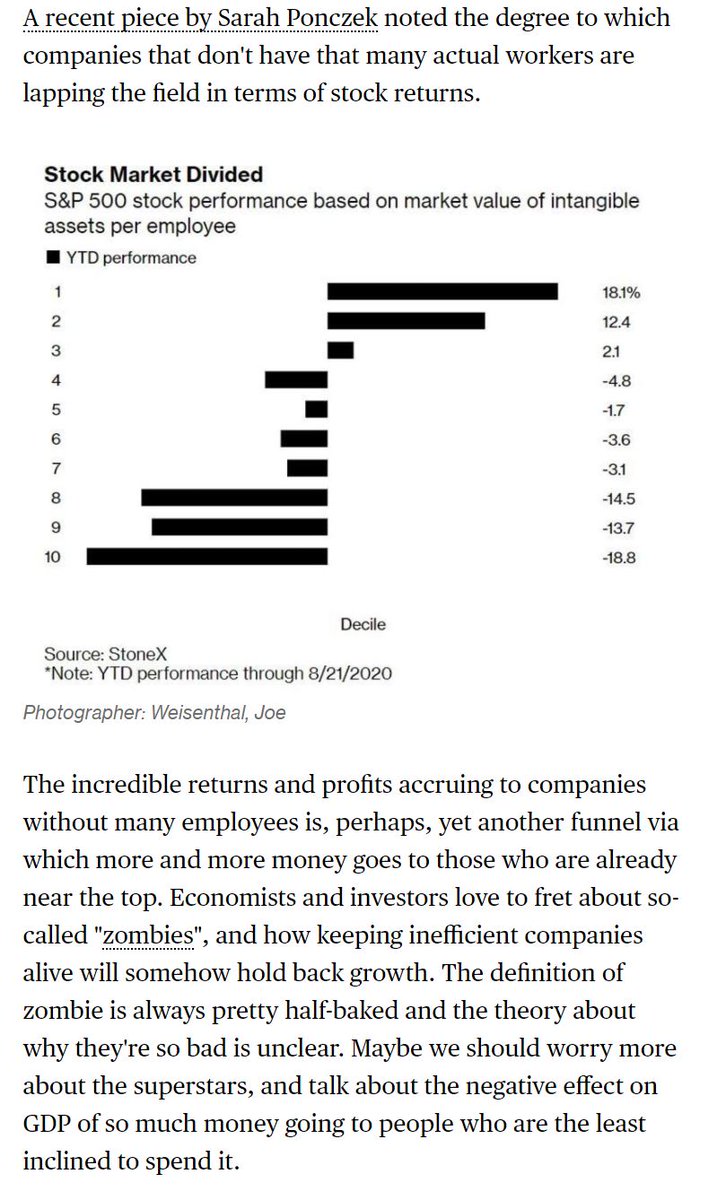I& #39;M MORE WORRIED ABOUT SUPERSTAR COMPANIES THAN I AM ABOUT "ZOMBIES"
In today& #39;s @markets newsletter, I wrote about why the huge, booming tech companies could be holding back GDP growth more than the so-called "zombie" firms everyone likes to fret about https://www.bloomberg.com/news/newsletters/2020-09-02/five-things-you-need-to-know-to-start-your-day">https://www.bloomberg.com/news/news...
In today& #39;s @markets newsletter, I wrote about why the huge, booming tech companies could be holding back GDP growth more than the so-called "zombie" firms everyone likes to fret about https://www.bloomberg.com/news/newsletters/2020-09-02/five-things-you-need-to-know-to-start-your-day">https://www.bloomberg.com/news/news...
This is something I& #39;ve been thinking about since this piece from @SarahPonczek https://www.bloomberg.com/news/articles/2020-08-25/stock-market-warns-workers-that-they-re-the-problem-for-business">https://www.bloomberg.com/news/arti...
Basically, the economy would be better with less Facebooks, and more Post Offices
I think the obsession with "zombie companies" and how bad they are comes from two related places
1) The first is greed. People want to acquire cheap assets, or they want their competitors to die, so they invent an ideology that says it& #39;s bad that mediocre companies survive.
1) The first is greed. People want to acquire cheap assets, or they want their competitors to die, so they invent an ideology that says it& #39;s bad that mediocre companies survive.
2) The second thing is the belief that the key to growth is productivity and that productivity is exogenous. So you get this idea that to make the economy boom, we need people to come up with productivity enhancing things, rather than seeing productivity as a byproduct of demand.
But if you think that the key thing is demand, and that demand drives investment, driving productivity, then it& #39;s not about declaring some tech companies winners and declaring everyone else as zombies that should die, it& #39;s about fostering income equality to drive spending.
So anyway, from now on, less fretting about the economic conditions and policies that allow some marginally profitable companies to exist, and more fretting about the conditions that allow so much income to accrue to industries and companies that don& #39;t employ m any people.
Anyway! Sign up for the @markets newsletter here. http://link.mail.bloombergbusiness.com/join/4wm/markets-signup&hash=b9b2681361bede0e1069ca238efb1ec2">https://link.mail.bloombergbusiness.com/join/4wm/...
Something nobody ever seems to point out is how it& #39;s interesting that productivity growth is historically quite low, even though we have an economy that& #39;s dominated by some of the most productive companies in human history. Maybe more ultra-productive companies aren& #39;t the answer?
So while I was sleeping last night, @tracyalloway went on an extended subtweet tweetstorm of me about Zombie corporations. https://twitter.com/tracyalloway/status/1301354946290356226">https://twitter.com/tracyallo...
Thinking about this further. My fundamental issue with the entire Zombie company discourse (lol) is that it starts from the premise of capital scarcity. That there& #39;s some fixed or finite pool of capital, and that if one company has access to it, then another company does not.
Like if you keep a zombie airline or or a zombie mall afloat through cheap money or something, then somewhere unseen there& #39;s an innovative productive company out there that was deprived of that cash. And I just don& #39;t think that& #39;s a realistic characterization of the real world
It does seem possible that you could have this with labor. Like if the US government decided in 2005 that Friendster was a strategic national champion, and would have unlimited money to hire engineers, thus depriving FB/AMZN/GOOGL of access to talent. That& #39;d be an issue.

 Read on Twitter
Read on Twitter



